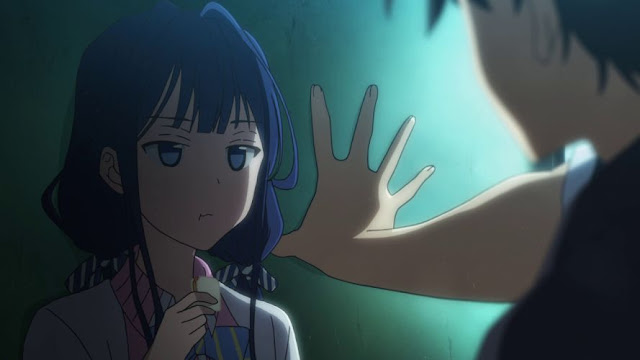I have watched many harem anime series, not without some ecchi, or maybe even all of them... I'm not even sure if I haven't watched more harems than reverse harems. If in harem there is at least 50 % chance that the male lead is tolerable and the story is legit, the same chance for reverse tends to zero, at least in my experience.
My views on 'Masamune' really went through many different stages...
Stage 1.
Arrogant bitches!
Arrogant bitches are much better for me than clumsy cuties who are loved by everyone around not so much despite their clumsiness but rather thanks to it.
He is the perfect boy trying to get the perfect girl and they gradually grow closer, though she wouldn't let him near willingly - this is what I expected...
Then suddenly
So, he's doing this simply as a technique? And her maid says she's willing to help because the heroine is too arrogant?
Isn't it just one more 'Taming of the shrew' then? I've seen it already and it's not something I enjoy very much. Moreover, the series turn out to be full of other round-faced girls with big eyes all running round the male lead creating pantsu-shot moments, and the heroine exhibits the traits of a perfect tsundere. If anyone needs a textbook on tsundere, here is one.
So, it's an ecchi harem? Then burn in hell, I thought.
Stage 2.
While she's not the perfect girl, he's not the perfect boy either. And it turns out, his true feelings about his own plan is a sight hilarious to behold.
Unexpectedly, I felt the right amount of madness in the humour of this series.
Starting from stupid little details, such as the shoujo manga used as a reference - 'The steroid with rose eyes'
up to the good old trick
The male lead's attempts to make the necessary impression which inevitably fail at first were a pretty good thing to follow
At least this is how I would react! This is how I would react and how I think every girl with a piece of common sense and knowledge should react!
Yes she knows and every girl should!
And it's probably the first time I see at least a glimpse of a conscious reaction on part of a girl...
So, just when it's starting to get too awkward because of all the rose colours and flowers and butterflies, the director makes a pause and puts something funny in between. If everyone were really serious and the characters were really meant to be just a fluttered tsundere, perfect boy, emotionless ruthless maid and frail maiden friend-and-rival, it would be intolerable.
If the male lead was serious about his plan every single moment, it would be intolerable.
Stage 3.
But when it gets too playful, the viewers may get irritated, too. And then...What is this? You must be kidding me? A real dramatic moment in an ecchi harem comedy?
How come, a real dramatic melody during a tense moment in the story? In an ecchi harem comedy? The male lead realising the difference between a person who thinks of him and a person who doesn't? What?!
An attempt to convey how the character feels?
An attempt to show the inner world of a character?
Much to my shock, 'Masamune' turned out to be not only a laughable comedy, but a lovable drama - of course, as much as it can be considered a drama at all, since it's just several high school students hanging out and living their youth.
By the last episode I was completely sure that I would
1. want to follow the story to the end, because it was already obvious the conflict was based around one huge misunderstanding, and the characters who might be considered 'enemies' or 'rivals' are not villains even in the slightest;
2. recommend it to anyone who wants to spend 4 pleasant hours without worrying too much, but without boredom, either.
The voice actors were all absolutely perfect for their characters, though I still believe the real abundance of unique voices is lost, and the voice bank of Japan can only offer a limited amount of typical voices for common cases as this. In other words, the times when a seiyuu made the character are gone, and there are more and more seiyuus who just follow the character. For almost every character in 'Masamune' I can offer a couple of replacements and I'm pretty sure you wouldn't know the difference.
The music was surprisingly good, as I mentioned, and I will say it again, the composer did a real job, creating tender melodies for tender moments, jazzy tunes for some fun, and tense pieces for tense moments.
If there is something I would like to throw into the trash can, it's the opening and ending theme. Just a couple of tunes I feel I have heard millions of times before.
So, what's in the end? In the end, the typical tsundere makes her typical punch to hide her embarrassment.
But I wished them good luck, as I felt they were a bit more real than so many other characters I've seen. I saw many people blaming it for none-creativity, but no, this ain't the case. I gave 3 to 'Princess Lover' and 1 to 'Diabolik lovers', but I did put 7 to 'Masamune'. And remember, I wished for it to burn in hell when I started.






























































